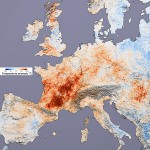Heat wave likely to intensify in European countries, study says
Heat waves will be "more frequent, persistent and intense" in European countries over the next few decades as greenhouse gases proliferate and raise temperature levels, a new study says.
A major heat wave swept through Russia in 2010 and killed thousands of people and damaged cropland, and researchers say it is now five to ten times more likely to experience heat waves of the same intensity in the next 40 years. The study was made by researchers at the University of Lisbon in Portugal and published last week in the journal Science.
"We were surprised," study author Erich Fischer told Bloomberg. "We had thought it was an anomalous event," added Fisher, who is also a researcher at the Swiss Federal Institute of Technology.
The study authors warn that heat waves will claim more lives unless "adaptive strategies" are done. These measures include campaigns against exercising during the hottest hours of the day, senior care, drought warnings and farmers' assistance, and health personnel training for treating heat wave-induced conditions.
About 55,000 people died in Russia due to extremely hot conditions last year. Additionally, wildfires multiplied and crop yields were reduced by 25 percent. The authors said another heat wave of the same magnitude hitting the same area will happen at the second half of this century.
According to the study, the heat waves that struck Europe in 2003 and 2010 were the worst to hit some areas in more than 500 years. Compared to 2003, the 2010 event was much more widespread and intense. Considering the rate of greenhouse gases being added to the atmosphere, the study team estimates that in the future there will be longer, more frequent and more intense heat waves.
